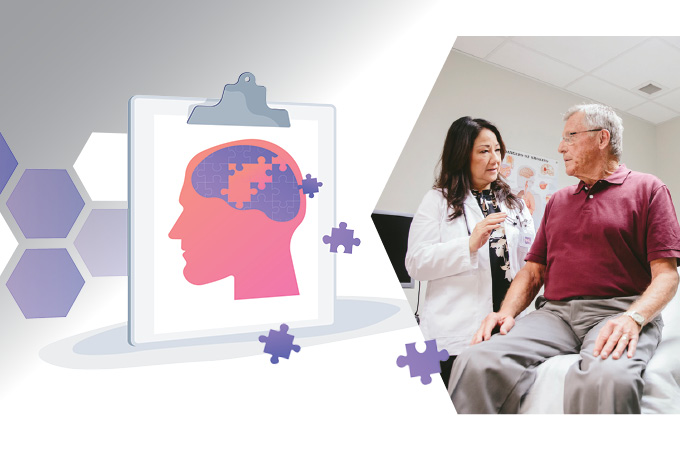The nearly 6 million adults in the U.S. who have Alzheimer’s disease face a difficult set of challenges as the neurodegenerative illness chips away at memory and physical function over time. Researchers constantly are searching for insight into symptoms and treatments. According to SSM Health DePaul Hospital neurologist Dr. Siddharth Kaul, recent discoveries are helping doctors identify possible early signs of Alzheimer’s through eye exams and blood tests.
“Changes in the brain can be reflected almost immediately in the eyes,” Kaul says. “During an exam, the doctor can look at small blood vessels in the eye. More research is being done to find out why, but a recent study suggested that people at risk for Alzheimer’s may have less vessel density circling the retina. If your doctor sees this, follow-up tests can be done to reach a diagnosis.”
Kaul says research also suggests that a blood test may help identify Alzheimer’s risk. The technique can compare proteins in the blood with those in a patient’s cerebrospinal fluid. “Proteins collect abnormally in the brain of a person with Alzheimer’s,” he says. “If doctors find increased levels of ‘bad’ protein, there may be higher risk for the disease.”
Adrienne Holden, regional health systems account director for the Alzheimer’s Association in St. Louis, says the screening advances are preliminary but offer exciting possibilities. “We are funding studies about hypertension’s effects on the condition, and about reducing risk through lifestyle interventions,” she notes. “We definitely are progressing in the field compared to 10 or 20 years ago and are very excited about how all of these pivotal advances will benefit people at risk.” Holden adds that important Alzheimer’s research is being done locally at Saint Louis University and Washington University.
Kaul says currently, a diagnosis is reached through a physical exam, patient history, information from caregivers and diagnostic testing. “The new screening advances may become mainstream in the future,” he says. “We won’t rely on one test to make a conclusion, but they look promising as a piece of the puzzle.”
He adds that healthy lifestyle choices play a big role in reducing Alzheimer’s risk. “Proper rest is one of the most important factors,” he explains. “When you sleep, your brain rids itself of the abnormal proteins that can cause problems. If you don’t get enough sleep, you likely will experience the effects later on.”
Photo courtesy of Alzheimer’s Association








